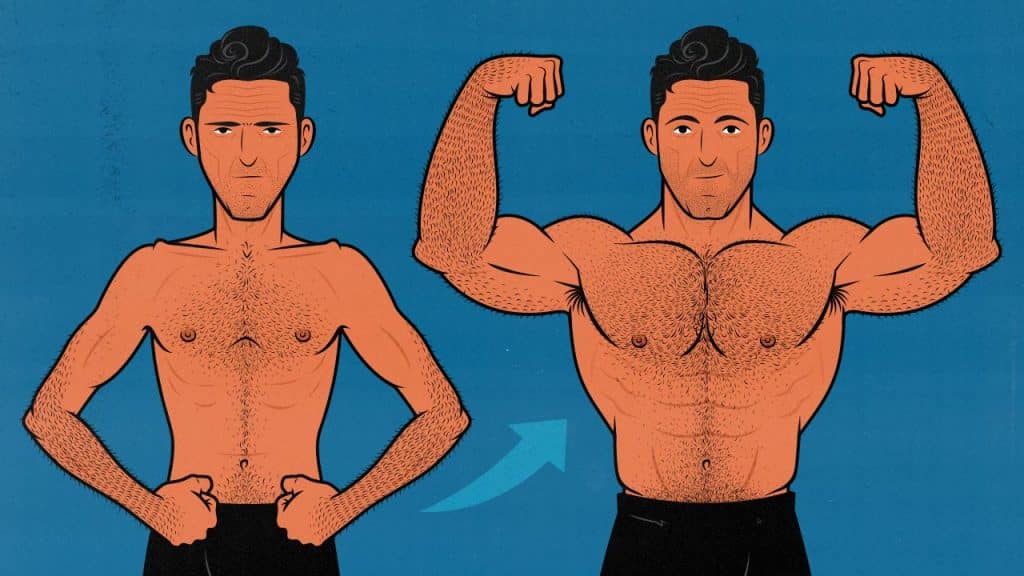
How Age Affects Muscle Growth
We’ve helped 15,000 skinny people bulk up, ranging from 18 to 80 years old. Marco has coached college, professional, and Olympic athletes revelling in the peak of their athletic performance. He’s also coached sedentary desk workers in their 20s, 40s, 60s, and 80s.
What we’ve seen matches what we see in the research, and what the research shows is shocking. We have pictures. You’re going to love this.
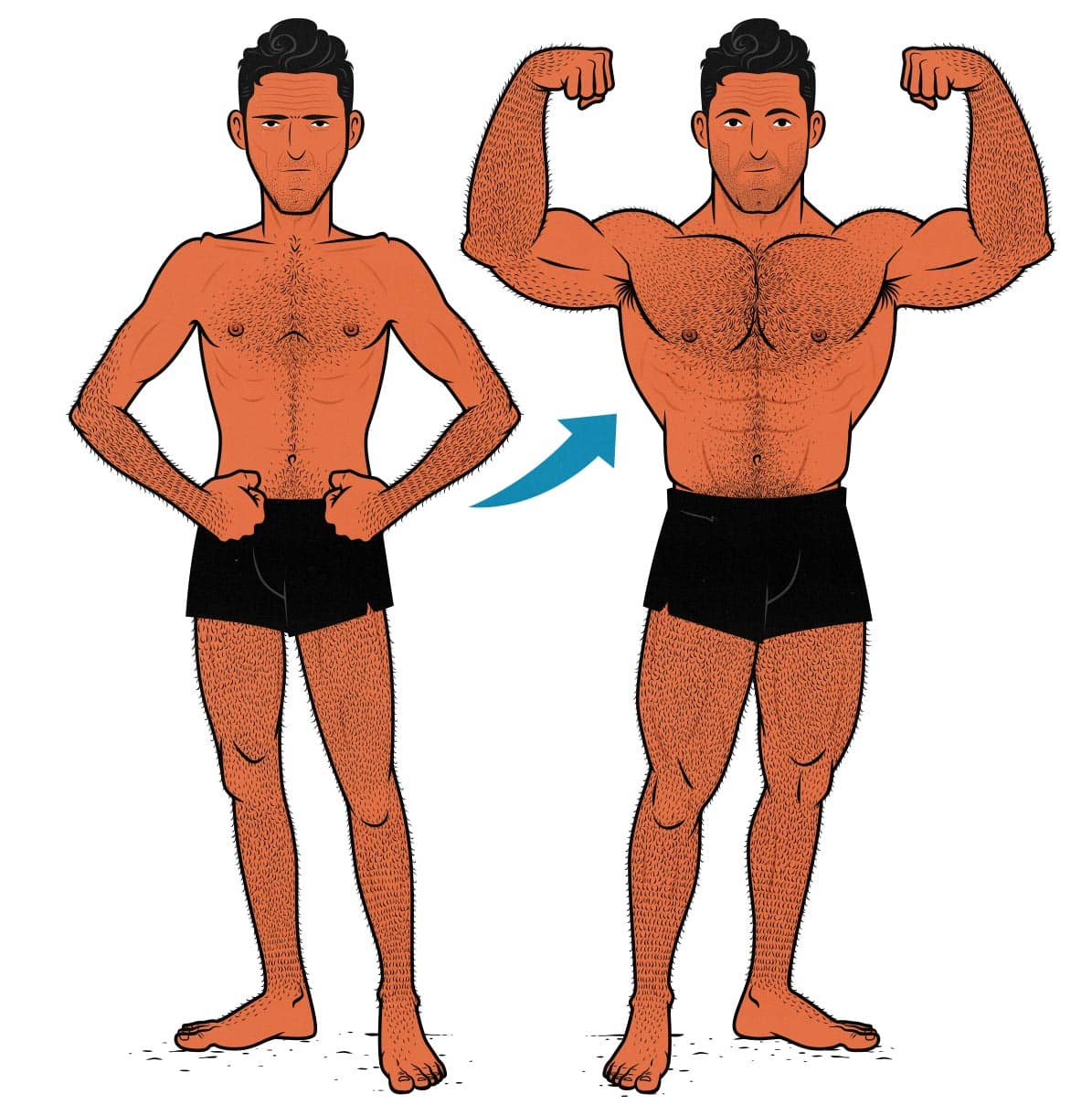
The Myth That Age Hinders Muscle Growth
It’s common for older people to have trouble building muscle. This is a real issue. But it’s a misleading one. It can make it seem like getting older makes it harder to build muscle. That isn’t what’s happening. Not quite, anyway.
Most guys worry about declining testosterone production as they age (study). That can happen, but it doesn’t seem to have as much impact on muscle growth as people expect. Subtle changes in testosterone production (within the healthy range) don’t affect muscle growth enough to reach statistical significance in most studies. Moreover, most guys can keep their testosterone production fairly high by eating a good diet, having a healthy amount of body fat, getting enough sleep, being physically active, and, of course, lifting weights (study, study, study, study, study).
There are three other factors that can have a larger impact on your ability to build muscle as you age, all of which depend on how you’ve been aging:
- Enfeeblement from a sedentary lifestyle. If you haven’t been regularly challenging the strength of your muscles, they may have gradually withered away. Perhaps in your youth, you were pleasantly fit, but over the years, you’ve ever-so-slowly melted into a puddle of skinny fatness. That muscle loss has nothing to do with age, it’s just the monthly fee of inactivity. If you get into shape, you can become stronger than ever before.
- The law of diminishing returns. If you’ve been gradually building muscle as you get older, your muscle growth will indeed slow and perhaps even grind to a halt. It’s not because you’re getting older, though; it’s because you’re butting up against your genetic muscular potential. If you went from 150 to 200 pounds between twenty and thirty, you can’t expect to get up to a lean 250 by forty, then a lean 300 by fifty. Your frame cannot hold an infinite amount of muscle. That’s why older lifters tend to be stronger and more muscular than younger ones, but they also find it more difficult to continue progressing.
- Maturity and drive. Many younger lifters are full of wild, passionate naivety. They often have more time but less money, putting vast amounts of reckless effort into shoddy workout programs. Some younger lifters need to be reminded not to overdo it. Many older lifters have more realistic goals, greater maturity, and a relentless, slow-burning determination. They often have busier lives but more money to spend. They often train more carefully and more efficiently, albeit with less zeal. Some older lifters need to be reminded to push themselves harder.
We’ll cover all of that in a moment. First, let’s talk about how your biological age really affects your muscle growth.
How Age Really Affects Muscle Growth
Hubal and colleagues had 585 people start training to build muscle (study). The researchers expected age to hinder muscle growth, so they only accepted participants between the ages of 18–40. They stratified the results by age, hoping to remove it as a confounding factor. To the researchers’ surprise, though, age didn’t affect muscle growth. After twelve weeks of working out, the forty-year-olds had gained just as much muscle as the eighteen-year-olds. The researchers speculated that age wouldn’t affect muscle growth until sixty years old.
A follow-up study by Lowndes and colleagues looked more directly at how age affects muscle growth (study). Once again, they put the participants on a twelve-week workout program. Once again, the older participants gained just as much muscle as the younger participants. The 39-year-olds gained just as much muscle as the eighteen-year-olds. Even more interesting, the older participants came into the study with more muscle mass and greater strength than those in their teens and twenties.
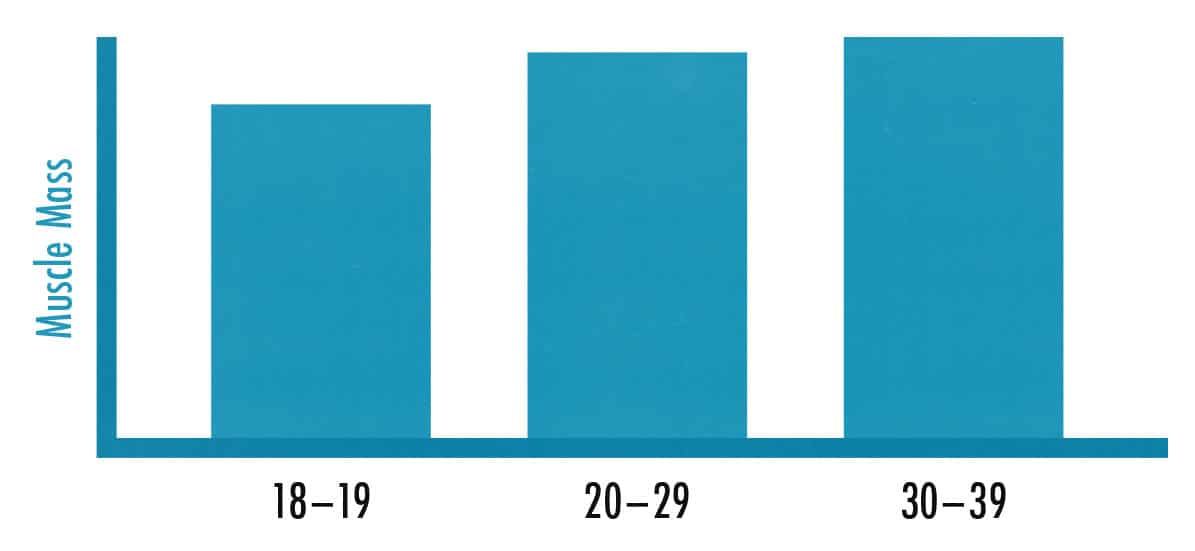
That last bit may sound surprising. Why would forty-year-old men be stronger (on average) than twenty-year-old men? The answer is simple: the forty-year-olds who lift weights have gradually accumulated muscle over a longer period of time. This is no surprise to anyone familiar with lifting. The strongest drug-tested powerlifters are in their forties. The same is true of the biggest natural bodybuilders. They’ve had more time to gain muscle and strength.
Speaking of strength, Greg Nuckols, a strength and hypertrophy researcher, analyzed powerlifting statistics to determine which age group could gain strength the fastest (article). He found almost no difference in the rate of strength gains between lifters ranging from twenty all the way up to seventy years old.
One thing to note is that power can decline with age. It’s common for elite athletes to retire in their thirties or forties because they lose some agility and explosivity. That isn’t a decline in muscle or strength, though. It seems to be neural. And besides, it’s mainly something that affects elite athletes, not everyday people.
If you begin lifting weights at seventy years old, you can expect to gain muscle and strength about as quickly as your teenage grandson.
Are You Too Old to Bulk Up?
We tend to face different problems at different ages. If you start lifting weights as a teenager, you might lift recklessly, drink too much, stay up too late, and be led down a bad path by a charismatic fitness influencer spending $11,000 per month on dangerous PEDs. On the other hand, you probably have plenty of free time and a fearsome fervour.
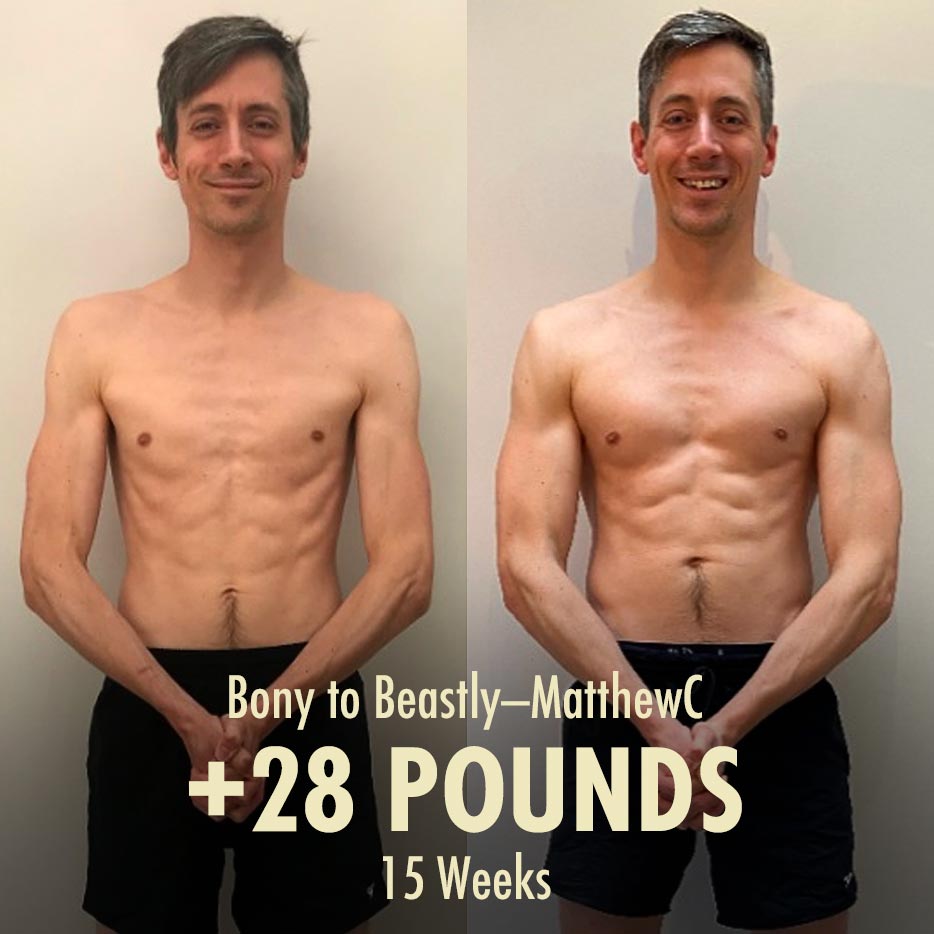
If you start lifting weights in your thirties, you might be thinking more long-term. You probably have a healthier mindset about building muscle. But bulking up can be hard when juggling kids, marriage, and long work hours. It’s a busy decade. It can be exhausting.
If you start lifting in your fifties, you probably have more money, more patience, and know the value of consulting bonafide experts. You’re probably sleeping through the night, too, perhaps for the first time in decades. But if you’re only just starting to exercise, you may have some deeply ingrained bad habits to overcome. Perhaps your posture has been gradually caving in on itself for the past thirty years. Maybe you’re nursing some nagging aches and pains. Maybe your lower back feels fragile.
Is 30 Too Old to Build Muscle?
We get this question all the time. 30 is when many guys first start to feel like their age is wearing away at their youthful vitality. Oftentimes, they’re working longer hours, getting married, and having children. These are all great things, but they can be stressful, and they can cause a temporary dip in your testosterone levels, especially if you aren’t able to get enough sleep (study).
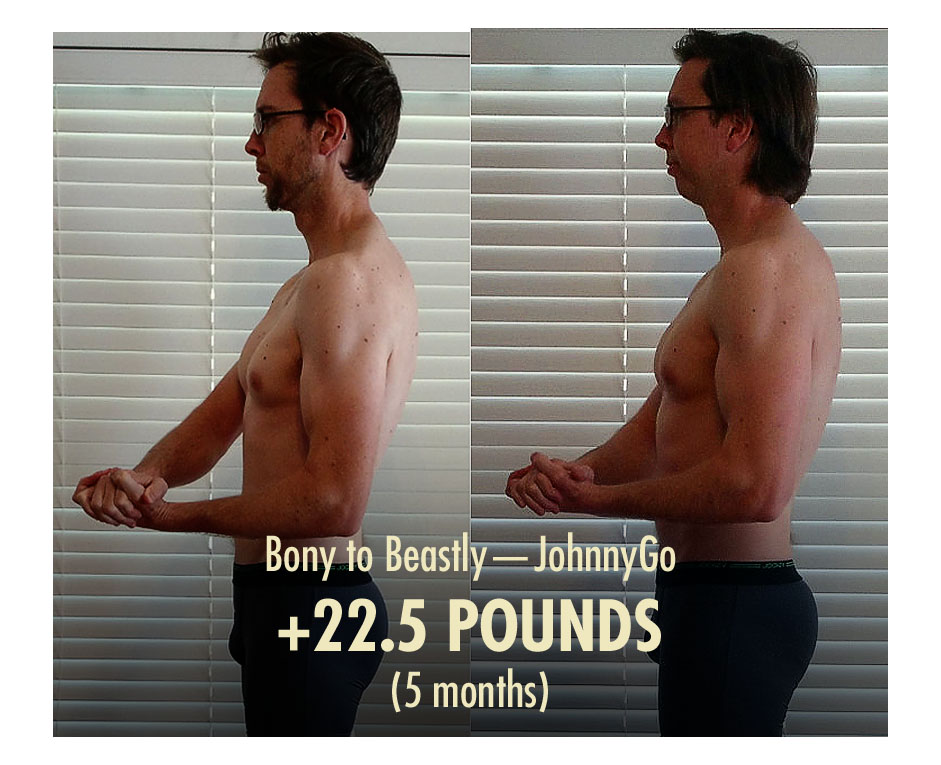
On the other hand, thirty isn’t biologically old. There’s no age-related decline to worry about. You can build muscle just as fast as anyone else. You can reach your full genetic potential. Your age won’t hold you back. Quite the opposite. Most men reach their peak strength and fitness in their thirties or forties.
I’m in my mid-thirties, and I’m bigger, stronger, and more muscular than ever before. I’m in better cardiorespiratory shape, too. On the other hand, life is also harder than ever before. I’m working longer hours, I’m managing more responsibilities, and my son routinely wakes me up in the middle of the night. When I try to fall back asleep, I struggle, distracted by the weight of all these new responsibilities. It’s harder to eat a good diet, lift weights, and find time for cardio. Mind you, my life also has more structure, I’m more mature, I have more money, and I’ve gained a powerful ally (my wife).
Is 40 Too Old to Build Muscle?
You can build muscle at forty just as easily as you would at twenty or thirty (study, study). In fact, it may start getting easier. You’re probably more mature, patient, and financially well-off. If you have kids, there’s a better chance of them being older, meaning you have a better chance of getting a good night’s rest. Perhaps most of all, you won’t be as easily fooled by the scams that plague the fitness industry.
If you start bulking at forty, you have at least two decades of optimal muscle growth ahead of you. You have more than enough time to reach your genetic muscular potential. You can also expect to get as strong as you would have if you’d started younger.
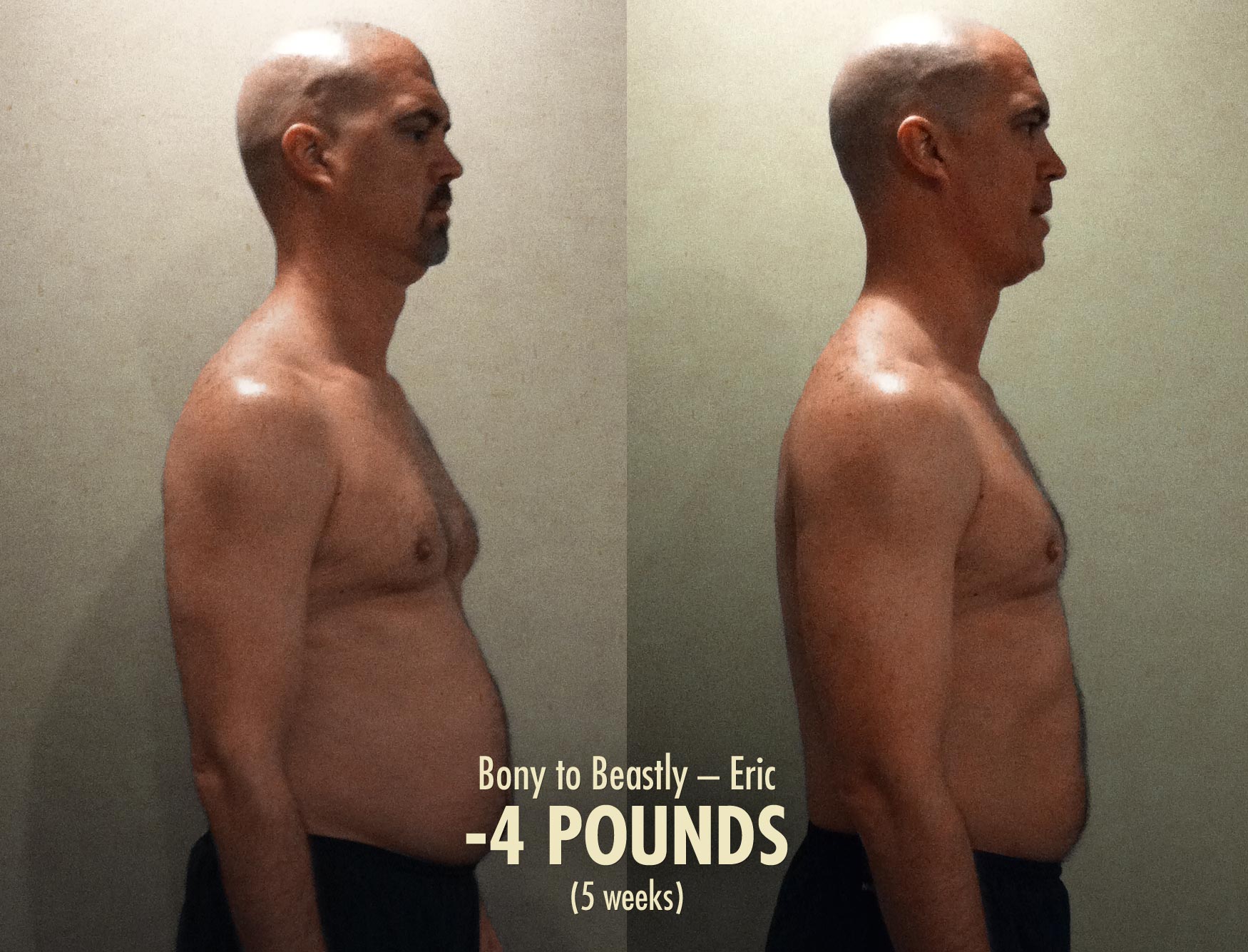
For example, here’s Eric adding inches to his arms while losing inches around his waist, showing simultaneous muscle growth and fat loss—all within his first five weeks.
Is 50 Too Old to Build Muscle?
If you start trying to bulk up at fifty, you can expect the same results as younger men. In fact, many men start to regain their testosterone in their fifties (study). Their kids are older, they’ve accumulated investments, and the fruits of their labour have eased their burdens. That isn’t true of every fifty-year-old, but it’s common enough to drag the average testosterone output upwards, at least in some studies.
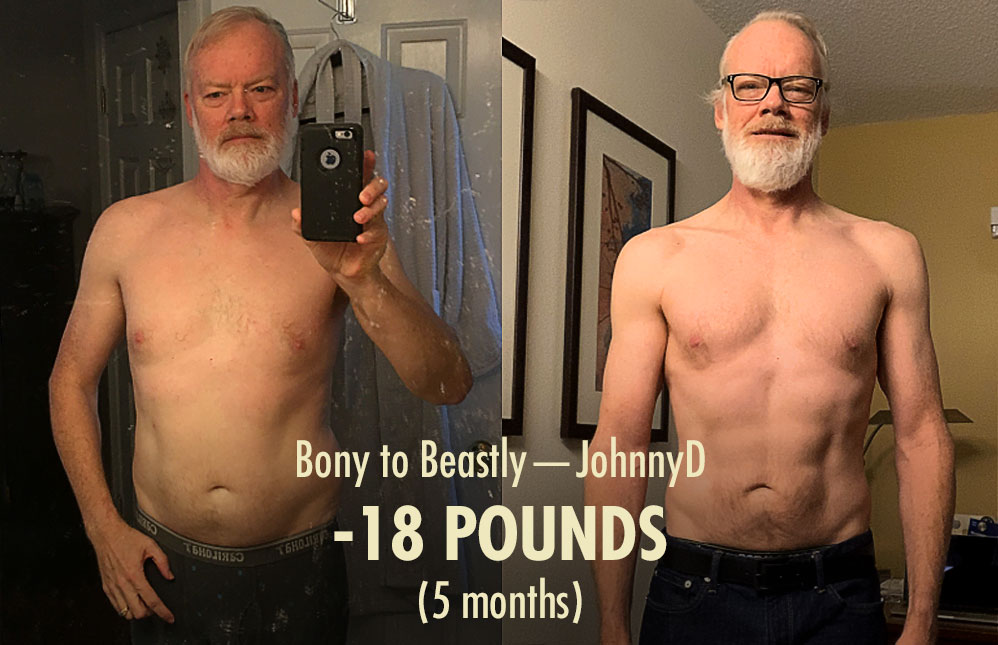
For example, here’s a before-and-after photo of Johnny D, showing both muscle growth and fat loss at fifty-seven years old. You can see that getting into better shape is making his skin look more youthful, too. He’s looking younger as he’s growing older.
The one thing to note is that your fifties might be the last decade when you can truly build muscle at full speed. There isn’t a sharp decline at sixty, but if you want to bulk up, now’s the best time to start. Better to roll into old age like a battering ram.
Is 60 Too Old to Build Muscle?
As we covered above, most research shows that men build muscle just as quickly at sixty years old as they do at eighteen. There may be a slight disadvantage, but that disadvantage is so trivial as to be virtually undetectable.

It may seem strange that older guys can bulk up just as fast as younger ones, but when you’ve coached enough of them, you can’t deny what you see with your own eyes. For example, here’s a before-and-after photo of Eddi as he’s bulking up for his sixtieth birthday. He gained 18.5 pounds in his first three months, which is comparable to what we see in our younger members.
“Said goodbye to my dietician last week. We decided that since I am officially no longer underweight, my treatment is done. Yeah! Thanks to you b2B guys!”
EddiB
It’s unclear how your ability to build muscle will change as you get deeper into your sixties. It may be that by the time you hit seventy, it gets notably harder. If you haven’t been lifting weights, this is a great time to start. That way, if it does become harder to gain and maintain muscle mass, you’ve already got some to spare.
Having more muscle mass greatly increases longevity. So does resistance training. So does having denser bones. This is the age when a lack of those things can start to cause problems. If you start bulking now, you have a much better chance of living a longer and healthier life.
Should You Train Differently As You Get Older?
Since age has very little effect on muscle growth, guys all the way from 18–60 can benefit from the same basic principles of hypertrophy training. A program that’s ideal for stimulating muscle growth will work just as well on a twenty-year-old as it will on a fifty-year-old.
With that said, younger guys might benefit from a program that urges them to be more cautious. Older guys might benefit from a coach who knows how to rehab the bodies of people who weren’t cautious. That has little to do with age, though, and more to do with your personality and injury history.
There might be a point somewhere in your fifties, sixties, or seventies when you benefit from taking it a bit easier in the gym. Lifting weights twice per week is enough to get all the health benefits of resistance training. Lifting weights three times per week is enough to build muscle at full speed. As you age, you may want to spend the other days of the week going on brisk walks or doing casual cardio. That way, your exercise routine is more balanced and easier to recover from.
Fascinating MRI Scans (40–70 Years Old)
This blew my mind when I saw it. The typical 70-year-old is sedentary, and their body composition reflects that. They’re “skinny-fat,” with quite a lot of fat and relatively little muscle. Here’s an MRI scan showing withered muscles drowning in a sea of body fat (study):
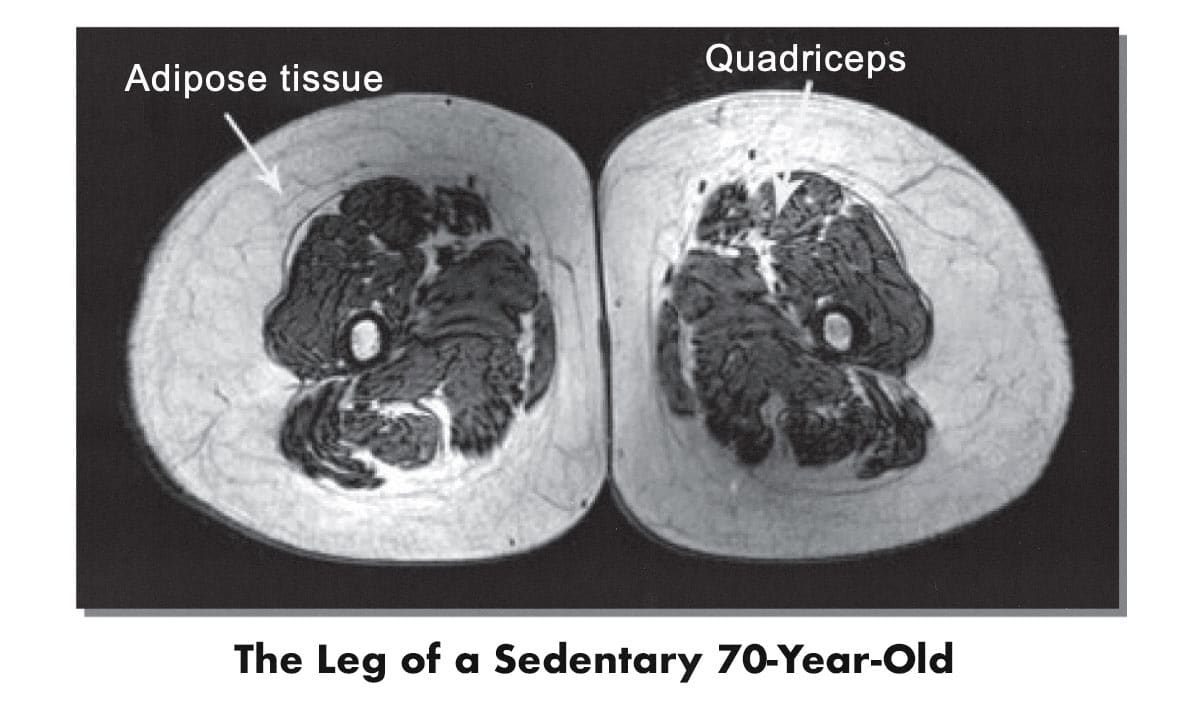
But you don’t need to let your body be consumed by the ghouls of atrophy. You can lift weights and do cardio. You can eat a good diet and live a healthy lifestyle. If you do, can maintain an athletic body composition. Here’s an MRI scan showing a 70-year-old with impressively lean and muscular legs.
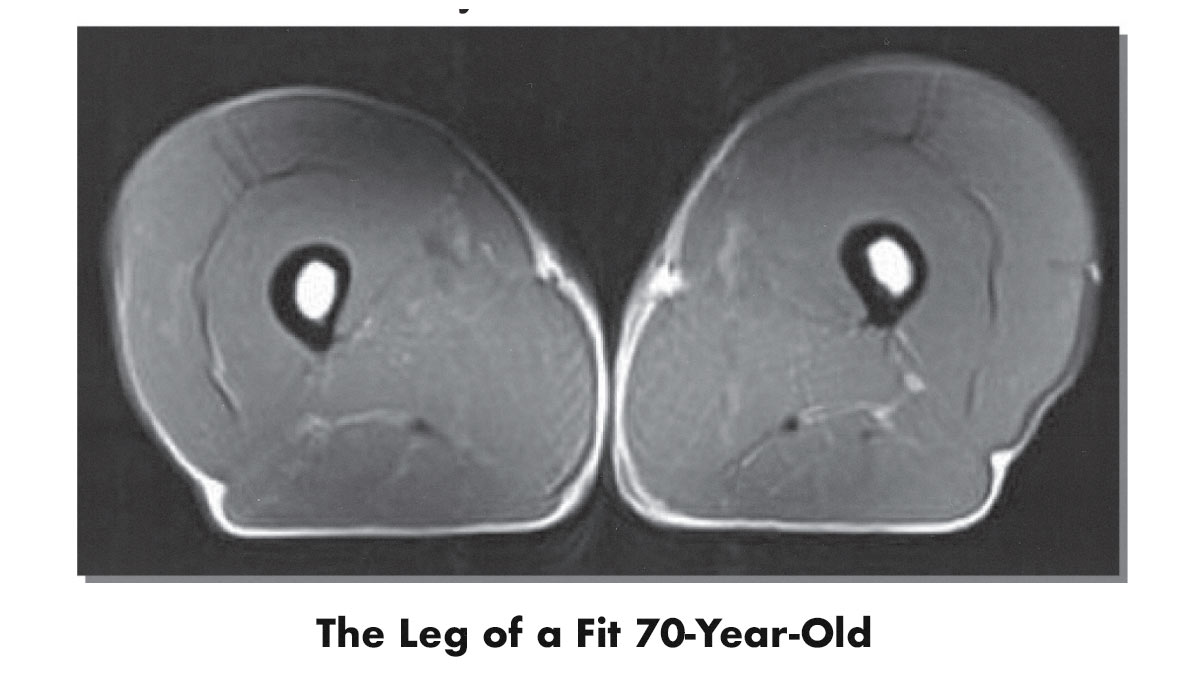
Now here’s where it gets interesting. You build muscle fast at first, but then that growth slows. It can take many years to reach the height of your natural muscular potential. If a bodybuilder starts young, they might be in peak condition in their late 30s or early 40s. If they start older, they’ll reach that peak at an older age.
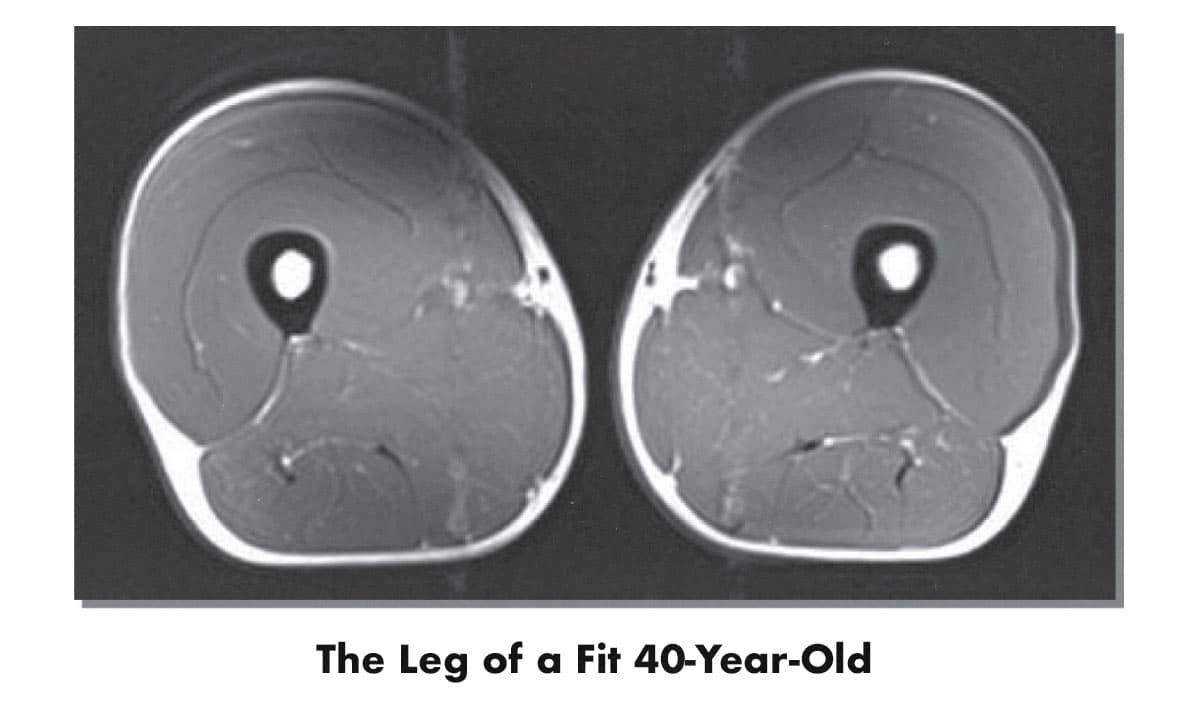
With that in mind, take a look at this 40-year-old, then scroll back up and look at the 70-year-old. Their body composition is exactly the same. Same amount of muscle and fat. Age has not degraded the 70-year-old’s muscles whatsoever.
Research Updates
In the first study, 65–85-year-olds all gained impressive amounts of muscle from following a weight-training program (study). The oldest people being studied (85 years old) gained a similar amount of muscle to the youngest (65 years old).
More specifically, the 85-year-olds increased their quad size by 11% after only 12 weeks of working out. Those are muscle-building results an 18-year-old would be thrilled with. That’s a successful bulk at 85 years old!
This isn’t just some abstract thing we see in papers. Marco has worked with professional and Olympic athletes at the height of their explosive power. He’s also helped people in their 60s, 70s, and 80s gain muscle and strength.
In the second study, 70-year-old men who lift weights have similar amounts of muscle as younger men (study). So, once again, if you train for muscle and strength, you can build and keep muscle as you age.
In the third study, Latella and colleagues found that age doesn’t have much impact on how quickly people gain strength until 69 years old. Rather, beginners gained strength more quickly than experienced lifters, and gains slowed gradually over time. That means older lifters tend to gain strength more slowly, but only because they’ve been lifting for longer, not because they’re older.
Summary
18-40 year old men can gain muscle at full speed. Muscle growth may not begin to slow until at least 60. Strength gains don’t seem to slow until about 70. Building impressive amounts of muscle is still realistic at 85.
If you feel your age is limiting your muscle growth, it might not be your biological age causing the problem. Muscles atrophy with disuse. Physical fitness fades with inactivity. Posture crumbles as it weakens. You can mitigate these problems by getting into better shape, eating a better diet, and living a healthier lifestyle.

Alright, that’s it for now. If you want more muscle-building information, we have a free muscle-building newsletter. For a full workout, diet, and lifestyle program, including a customizable full-body workout routine, a diet guide, a recipe book, and online coaching, check out our Bony to Beastly Bulking Program. If you’re already in the habit of lifting weights, maybe check out our Outlift Intermediate Hypertrophy Program.

